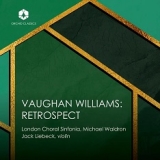Ob englische Volksmusik, Bachsche Fugenkunst, Renaissance-Reminiszenzen oder expressive Orchesterwerke: Ralph Vaughan Williams war ein äußerst wandelbarer Komponist, und diese Wandelbarkeit ist auch der rote Faden des neuen Albums mit der London Choral Sinfonia.
Es beginnt mit Windsor Forest, einer reizvollen Falstaff-Minioper, die hier mit viel Energie aufgeladen wird. Die London Choral Sinfonia beeindruckt durch ihren spritzigen Vortrag, durch die beherzten Akzente auf volkstümliche Themen sowie ein klares und differenziertes Klangbild.
Zweimal Bach durch die Brille von Ralph Vaughan Williams: ‘Schmücke Dich, O Liebe Seele’ wird fein und verinnerlicht von Thomas Carroll auf dem Cello gesungen, begleitet von beseeltem Streicherklang. Die ‘Giant Fugue’ hat auch in dieser romantischen Lesart eine klare Struktur, und Michael Waldron animiert seine Streichergruppe zu ungekünsteltem, zart rhetorischem Spiel.
Im ungewöhnlich kurzen Violinkonzert erleben wir einen engagierten Jack Liebeck mit griffigem Klang und virtuoser Brillanz im ersten Satz, einem Höchstmaß an Sensibilität im Adagio und fast schon aufreizender Nonchalance und schöner Kantabilität von Solist und Orchester im Perpetuum mobile des Finales.
Die typisch britische Festlichkeit, ohne übertrieben schwelgerisches Pathos, zeigt die London Choral Sinfonia im Milton-Lied ‘Nothing is here for tears’. Das schöne Programm schließt mit einer anmutigen, poetischen Interpretation von ‘Silent Noon’. Der Tenor Andrew Staples stellt sich in keinem Moment der zarten Wirkung dieser Musik in den Weg ebenso wenig wie die Streicher der London Choral Sinfonia, die einmal mehr mit ihrem feinen, zarthauchen Klang den Dialog mit ihrem Vokalpartner sucht und der Musik zusätzlich Wirkung verleiht.
Whether English folk music, Bach fugues, Renaissance reminiscences or expressive orchestral works: Ralph Vaughan Williams was an extremely versatile composer, and this versatility is the common thread of the new album with the London Choral Sinfonia.
It begins with Windsor Forest, a charming Falstaff mini-opera that is charged with energy. The London Choral Sinfonia impresses with its lively performance, bold accents on folk themes and a clear and differentiated sound.
Bach twice through the lens of Ralph Vaughan Williams: « Decorate Yourself, O Dear Soul » is sung delicately and intimately by Thomas Carroll on cello, accompanied by a soulful string sound. The ‘Giant Fugue’ also has a clear structure in this romantic reading, and Michael Waldron encourages his string section to play in an unaffected, delicately rhetorical manner.
In the unusually short Violin Concerto, we experience a committed Jack Liebeck, with a catchy sound and virtuoso brilliance in the first movement, a high degree of sensitivity in the Adagio, and an almost provocative nonchalance and beautiful cantabile playing by soloist and orchestra in the perpetuum mobile of the finale.
In the Milton song « Nothing is here for tears, » the London Choral Sinfonia displays typical British festivity without exaggerated, indulgent pathos. The beautiful program closes with a graceful, poetic interpretation of ‘Silent Noon’. Tenor Andrew Staples never gets in the way of the delicate effect of this music, nor do the strings of the London Choral Sinfonia, whose fine, delicate sound once again seeks a dialogue with its vocal partner, giving the music additional impact.






















